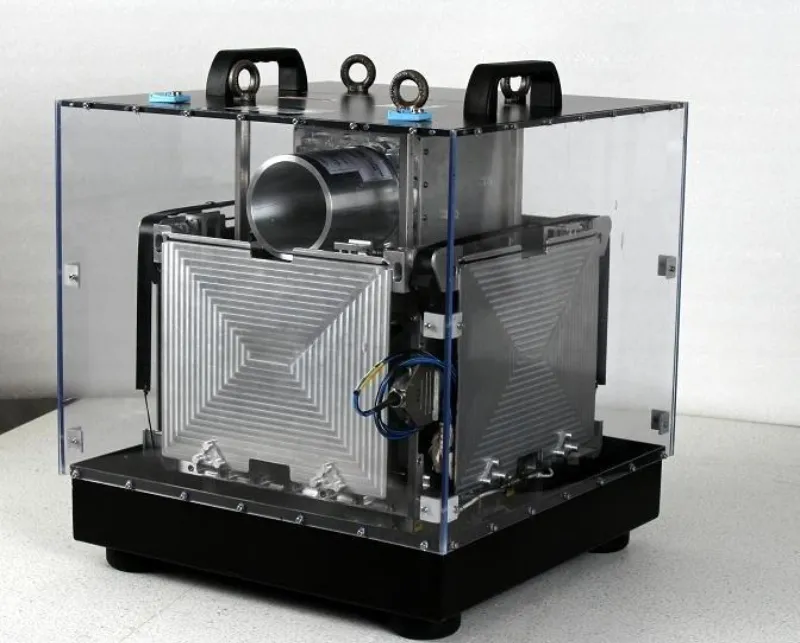Investor interest in Indian spacetech startups takes off. Here’s why
The year 2021 has already seen three big deals in the Indian spacetech startup ecosystem with Agnikul and Skyroot each raising $11 million, the most raised in the sector to date. Industry experts say this is only the beginning as investor interest continues to grow.
The Indian spacetech startup sector has long been regarded with caution by the investment community. But now, no longer.
Investors are now eyeing the space as a viable investment — thanks to a number of factors, including the Indian government’s move to open up the spacetech sector to include private players, as well as lower costs to make and launch satellites, proof of returns on investments, clear market demand for geospatial data, and technological advancements in the space.
Last week, two Indian spacetech startups — Agnikul Cosmos and Skyroot Aerospace — each announced they had raised $11 million in their Series A funding round, the most raised in a single deal by Indian private space sector operators till date. This followed the $7.3 million seed funding round raised by small satellite startup Pixxel in March this year, and $10 million raised by Vesta Space from US-based investment firm Next Capital in 2020.

Anand, Pixxel’s first satellite of the constellation has been already manufactured and is expected to be launched soon. [Image Credit: Pixxel]
Admittedly, this is reflective of a larger global trend as investors across the world turn bullish on the space as more and more success stories emerge from the sector.
According to research conducted by Seraphim Capital, a global specialist investment group focused on the space industry, overall venture capital investment in the sector in the first half of 2021 is likely to be more than double that of 2020, even as last year saw a 95 percent increase in investments from the prior year. In the first quarter of 2021 alone, venture investment into the sector was $2.7 billion, compared with $1.6 billion in the same period last year, Seraphim Capital research showed.
In India too, Indian spacetech startups have raised a total of nearly $31 million in funding so far this year in 2021, according to YourStory Research’s analysis of disclosed deals. That’s a 70 percent increase from the $18.2 million raised by the sector in all of 2020, and a nearly nine-fold increase from the $3.7 million raised in 2019.

One spacetech startup that’s witnessed first hand the growing investor interest in the space is Agnikul Cosmos, whose core product, Agnibaan, is a small satellite launch vehicle capable of carrying up to 100 kg of payload to low earth orbits.
Founded by Srinath Ravichandran, Moin SPM, and Prof SR Chakravarthy, Agnikul Cosmos had raised funding in each of the past three years — an undisclosed amount in 2019, $3.2 million (as disclosed) in 2020, and $11 million (as disclosed) in 2021.
“With each year, we have only founder investor interest increasing in the sector. There are two main factors behind this, one is opening up the spacetech sector and the government support and secondly, investors across the globe have now realised that if they invest in spacetech, they can expect returns and that it is not just a gamble,” Agnikul CEO Srinath Ravichandran tells YourStory.
In May 2020, Finance Minister Nirmala Sitharaman announced the inclusion of private players in the space sector. Later that same year, in June, the Union Cabinet announced the formation of an autonomous nodal agency, Indian National Space Promotion and Authorisation Centre (IN-SPACe), an extension of ISRO, which is aimed at including private players in space related activities and regulating private tech innovation in the space.
Earlier in an industry event, ISRO had explained that nodal agency IN-SPACe would be responsible for monitoring the private players and will also be involved in the “promotion and handholding of industries, building launch vehicles and satellites, sharing ISRO facilities, establishing several facilities such as launch pad inside the Department of Space (DoS) premises, and monitor space-based services”.
Tech advancements, government tailwinds
To be clear, access to risk capital has been seen as a major challenge for the sector to realise its trillion-dollar-growth potential, but that’s quickly changing due to clear evidence of customer demand and technological advancements in the space, on the back of government-induced tailwinds, say industry experts and spacetech startup founders.

“Large customer demand and talented management combined with the viability of tech such as 3D printing, which wasn’t possible 20 years ago, as well as an ecosystem geared to support startups development amidst government tailwinds, makes the perfect storm come together to make spacetech investing in India viable finally,” says Vikram Godse, Managing Partner, Mayfield India, which has invested in spacetech startup Agnikul.
Without a doubt, spacetech technology has evolved with time, as technological developments have helped bring down the cost of making satellites and launching them.
Conventional big-sized satellites are being replaced with small satellites that can do the same job but at lower costs. Deployment of small satellites constellation not only reduced cost and the amount of time but also reduced the risk of mission failure. The reduction in cost has also enabled enterprises and governments to leverage geospatial data for other use cases such as weather, agriculture, commodities, insurance, and risk management, among others.
"Technology-led interventions are necessary to enhance agricultural productivity and improve farmer incomes without further degrading the environment. Satellite imagery and remote sensing data are invaluable tools for forecasting agricultural output, regulating crop inputs, and even calculating how much carbon farmers are sequestering. Multispectral, synthetic aperture radar (SAR), and hyperspectral satellites can create rich datasets, yielding deep insights to make farming more profitable, resilient, and sustainable," says Mark Kahn, Managing Partner, Omnivore.
Investors further add that interest in the global and Indian spacetech sector has heightened on the back of an increase in commercial space applications, space policy changes and reforms, success stories of spacetech players across the world, as well as growing participation of startups and private players in a domain that has until now largely been under government control.
“It’s encouraging to see how the new space policy and reforms in India have opened up spacetech for more commercial and startup participation and how agencies like the Indian Space Research Organisation (ISRO) are partnering with startups for current and future space programmes,” says Jatin Desai, Managing Partner, Inflexor Ventures, which has invested in Bellatrix Aerospace, a spacetech startup that is building rocket propulsion systems.
Jatin, who is bullish on the spacetech space in India, believes the Indian spacetech startup space may likely see a unicorn emerge in the next three to five years.
Others like Pixxel Co-founder Awais Ahmed and Vishesh Rajaram, Managing Partner at Speciale Invest, which has invested in startups like Agnikul and Astrogate Labs, share the same bullish outlook for the sector.
“We believe we are at an early stage of the private space revolution, and we believe India will play a meaningful role. The total market is projected to be in the trillions, and we believe India can get between 5 percent and 10 percent of this market across launch, satellite, communication, and downstream services,” says Vishesh Rajaram, Managing Partner at Speciale Invest.
Unlike commonly held beliefs that investments into spacetech startups require a long gestation period, Vishesh views these as ‘misconceptions’, adding that in Speciale Invest’s experience, all its investee partners are generating revenues or have been on a strong path to revenues within the first two years of raising capital.

Full 3D printed semi cryogenic rocket engine Agnilet. [Image Credit: Agnikul Official Twitter]
What investors want: spacetech startups' take
Still, both investors and spacetech startup founders believe continued government and investor support will be needed as the sector matures in India. They add that startups will also have to demonstrate sound business models, early validation from customers, and the team’s execution and tech capabilities.
“While raising money, spacetech players will need to ensure that the business model is explained to the investors in a simple manner, and that the prototype is ready for the investors to understand the product. While building the main product may definitely take time, a prototype should be ready,” says Agnikul’s Srinath.
Speaking along similar lines Awais Ahamed, Co-founder, and CEO of Pixxel, explains that the investor ecosystem is looking at success stories from across the world such as successful test firings, satellite launches, and are understanding that there is a demand for the data.
“I think startups need to have a clear business model and a prototype to help the investor understand the company and its clear goals. We were able to build a version of our satellite, hire a good team, and have client demand for the satellite data ahead of our funding rounds,” he adds.
According to a PwC report, the Indian space economy is valued at $7 billion and comprises two percent of the global space economy. It adds that the Indian space sector needs to grow at an approximate rate of 48 percent CAGR over the next five years to reach its target of $50 billion.
Indeed, with the public and private sector coming together along with favourable space policies and increasing investor interest in this deep-tech space, the Indian spacetech startup ecosystem appears fully poised for take-off.
Edited by Teja Lele









